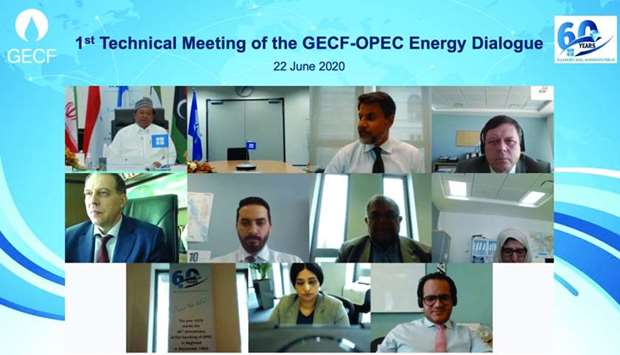An Opec-GECF energy dialogue through webinar focused on the impact of Covid-19 on global economy, oil and gas markets, medium- and long-term energy market assumptions and perspectives, as well as technical collaboration on data and statistics.
The GECF was led by its secretary general Yury Sentyurin while Opec secretary general Mohamed Sanusi Barkindo led its delegation to the 1st Technical Meeting of the "Opec-GECF Energy Dialogue" recently.
The two organisations also “renewed their commitment to laying the groundwork of closer collaboration” even under the unprecedented circumstances being faced by the global economy.
The meeting also reached a consensus on the importance of energy security and maintaining stability in the energy markets as well as supporting and promoting the unique importance of multilateralism.
Kicking-off the discussion, Barkindo referred to the recent decisions taken by participants of the Declaration of Cooperation at the 9th, 10th and 11th (Extraordinary) Opec and non-Opec Ministerial meetings held in April and June to adjust overall crude oil production by 9.7mn barrels per day for May and June, with a further extension until the end of July agreed at the 11th meeting.
Further adjustments are to take place for a total of two years under the initial agreement, until December 31 by 7.7mn bpd; and from January 1, 2021 to April 30, 2022 by 5.8mn bpd.
Barkindo spoke about the “great many things” the Gas Exporting Countries Forum is and the Organisation of the Petroleum Exporting Countries have in common, including many of the same member countries, the essential nature of both organisations for the development of mankind, and organsational goals.
“I believe there is a great deal that we can learn from each other,” Barkindo said.
Highlighting that the themes that bind the two organisations together also hold the potential to be make them thrive, Sentyurin said, “We consider the GECF-Opec memorandum of understanding to be a milestone in the evolving relationship between our entities. Since the signing of the bilateral MoU between GECF and Opec in Moscow on the sidelines of the Russian Energy Week in October 2019, our collaboration has been developing incrementally due to the ongoing fruitful dialogue and enabling working contacts between our officials.”
Speaking about the pressing issues facing the oil and gas industry, the GECF secretary general remarked that, at present, the forum is elaborating a new post-Covid-19 scenario, which forecasts natural gas demand to decline in 2020 by 2.8% in the best-case scenario and up to 6% in the worst-case scenario.
Further, any recovery and anticipated rebound of the economy in 2021 is unlikely to compensate for the losses the industry has incurred, and that gas demand could reach the 2019 levels only in 2022.
According to long-term projections, natural gas will remain an “indispensable” fuel for energy transition. However, gas consumption in 2050 can be 2%-3% less (or between 100 bcm to 200 bcm less) than the volumes the GECF forecasted as recently as February 2020.
Moreover, a prolonged period of increased gas affordability provides strong economic and environmental reasons for governments in consumer countries to strategically realign energy policy towards natural gas.
In October 2019, the GECF and Opec had signed an MoU to “exchange knowledge, experience, views, information, data and practices in the areas of mutual interest.”

